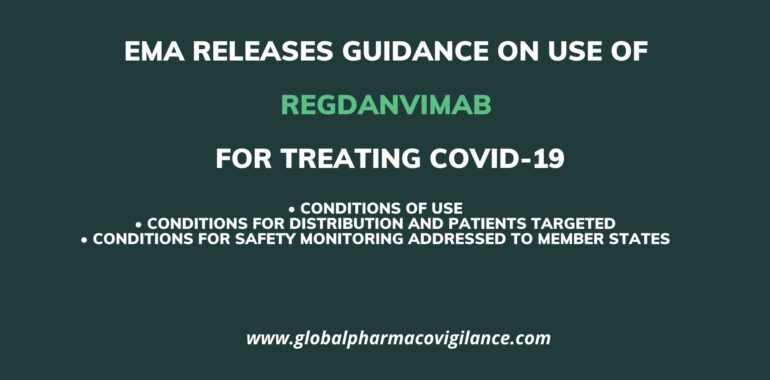EMA releases guidance on the use of Regdanvimab for treating COVID-19

EMA releases guidance on the use of Regdanvimab for treating COVID-19
EMA releases guidance on the use of Regdanvimab for treating COVID-19
On 26 Mar 2021, EMA’s human medicines committee (CHMP) has completed its review of the use of monoclonal antibody regdanvimab in the treatment of COVID-19 patients.
EMA’s has concluded that Regkirona (regdanvimab) can be used for the treatment of confirmed COVID-19 in adult patients who do not require supplemental oxygen therapy and who are at high risk of progressing to severe COVID-19.
Despite the uncertainties, the CHMP concluded that regdanvimab can be considered a treatment option for patients at high risk of progressing to severe COVID-19, based on a reasonable likelihood that the medicine may provide clinical benefit, and a low likelihood of harm.
Table of Contents
EMA releases guidance on the use of Regdanvimab for treating COVID-19
About Medicine
| Name of the medicinal product for Use | Regkirona |
| Active substance(s) | Regdanvimab |
| Pharmaceutical form | Concentrate for solution for infusion |
| Route of administration | Intravenous infusion |
| Strength | 60 mg/ml |
Regdanvimab is a recombinant human IgG1 monoclonal antibody. The mechanism of action for regdanvimab in treating patients with SARS-CoV-2 infection is the binding of regdanvimab to the receptor binding domain (RBD) of the spike(s) protein of SARS-CoV-2 with dissociation constant KD = 0.065 nM, thus, inhibiting the interaction between the SARS-CoV-2 RBD and the cellular receptor, namely the angiotensin-converting enzyme 2 (ACE2), and consequently blocking cellular entry and SARS-CoV-2 infection.
Celltrion use of regdanvimab (Monoclonal antibody) for the treatment of COVID-19 under Article-5(3) procedure.
EMA has released guidance on
- Conditions of use
- Conditions for distribution and patients targeted
- Conditions for safety monitoring addressed to member states
Conditions of use
Regdanvimab may only be administered in settings in which health care providers have immediate access to medicinal products to treat a severe infusion reaction, such as anaphylaxis.
Limitation in Patients with Severe COVID-19
Regdanvimab may be associated with worse clinical outcomes when administered to hospitalized patients requiring high flow oxygen or mechanical ventilation with COVID-19.
Target Population
Regdanvimab is indicated for the treatment of confirmed COVID-19 in adult patients that do not require supplemental oxygen for COVID-19 and who are at high risk of progressing to severe COVID19.
Risk factors may include but are not limited to:
- Advanced age
- Obesity
- Cardiovascular disease, including hypertension
- Chronic lung disease, including asthma
- Type 1 or type 2 diabetes mellitus
- Chronic kidney disease, including those on dialysis
- Chronic liver disease
- Immunosuppressed, based on prescriber’s assessment. Examples include: cancer treatment, bone marrow or organ transplantation, immune deficiencies, HIV (if poorly controlled or evidence of AIDS), sickle cell anaemia, thalassaemia, and prolonged use of immune-weakening medications.
Summary of the safety profile
The safety of regdanvimab is based on interim data from a Phase 2/3 trial of 325 non-hospitalised patients with COVID-19 (Study CT-P59 3.2 Part 1).
The most commonly reported adverse reaction associated with regdanvimab in mild to moderate COVID-19 patients was hypertriglyceridaemia (2.8%).
Adverse reactions reported with regdanvimab based on experience from clinical trials in healthy subjects and mild to moderate COVID-19 patients.
Frequency of Adverse reactions are defined as follows: very common (≥1/10); common (≥1/100 to <1/10); uncommon (≥1/1,000 to <1/100); rare (≥1/10,000 to <1/1,000).
The most common adverse reactions are
- Neutropenia
- Hypertriglyceridaemia
The uncommon adverse reactions are
- Hyperkalaemia
- dyslipidaemia
- Headache
- Hepatitis
- Rash
- Proteinuria
- Fever
- Blood triglycerides increased
- gamma-glutamyltransferase increased
- blood creatine phosphokinase increased
- blood lactate dehydrogenase increased
- C-reactive protein increased
- Infusion-related reaction (e.g. fever and dyspnoea)
Conditions for Safety Monitoring
This medicinal product is subject to additional monitoring. This will allow quick identification of new safety information. Healthcare professionals are asked to report any suspected adverse reactions.
Reporting of suspected adverse reactions
Reporting suspected adverse reactions after authorisation of the medicinal product is important. It allows continued monitoring of the benefit/risk balance of the medicinal product. Healthcare professionals are asked to report any suspected adverse reactions via the national reporting system.
Source from EMA website.
To know more, EMA releases guidance on the use of Regdanvimab for treating COVID-19 @ Click here
Top Covid 19 related articles:
Potential-risks-associated-with-the-compounding-of-remdesivir-drug-products
Pfizer-biontech-covid-19-vaccine-safety-data
FDA-briefed-moderna-covid-19-vaccine-safety-data
Oxford-University-Astrazeneca-covid-19-vaccine-safety-data
Safety concerns-of Covid-19 vaccines